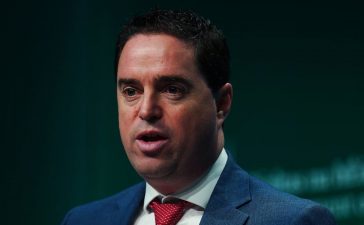The House Energy and Commerce Committee is meeting today to consider a bill that would force ByteDance, the Chinese tech giant that owns TikTok, to sell the app to an American owner. This forced divestiture bill might be Congress’s last hope to meaningfully mitigate the national-security risk posed by ByteDance’s extensive ties to the Chinese Communist Party.
The main issue here is that ByteDance is beholden to the CCP. It hosts an internal CCP committee for party members to promote Xi Jinping thought within the company and has signed cooperation agreements with Chinese law-enforcement agencies. TikTok claims that it has 170 million U.S. users; ByteDance controls the platform that they turn to every day for entertainment and, yes, political news.
Now, ByteDance is interfering directly in the American legislative process by leveraging TikTok’s massive U.S. footprint — and the 170 million people it claims are on the app — to mobilize opposition to the new bill.
Reporters from the Spectator and CNN said today that some TikTok users have gotten a popup message urging them to call their representatives to press them to oppose the bill. The popup names their member of Congress and includes a button that helps them place the call.
One such message that the Spectator posted about featured a popup to help users in the D.C. area call Representative Eleanor Holmes Norton, the district’s House delegate.
RIGHT NOW: as if @tiktok_us doesn’t already track all your activity, it’s asking users to put in their zip codes and contact their members of Congress out of concern about @HouseCommerce and @committeeonccp bill pic.twitter.com/Sh3hUScueY
— Matthew Foldi (@MatthewFoldi) March 7, 2024
Politico, meanwhile, posted about a message prompting TikTok users to call Representative Earl Carter, a member of the House Energy and Commerce Committee.
Looks like TikTok is going on the offensive, asking its users to call members on the E&C committee to “stop a TikTok shutdown” https://t.co/WmW5ciF6Mt pic.twitter.com/5XzD8nNesa
— Olivia Beavers (@Olivia_Beavers) March 7, 2024
In a video response today, House Select Committee on the CCP chairman Mike Gallagher (R., Wisc.), one of the bill’s authors, described this as an “intimidation” tactic. “Here you have an example of an adversary-controlled application lying to the American people and interfering with the legislative process in Congress,” he said. Representative Raja Krishnamoorthi (D., Ill.), the panel’s ranking member and another leading sponsor of the bill, said that this TikTok feature uses the same geolocation feature that ByteDance employees used to track the locations of U.S. journalists in 2022.









